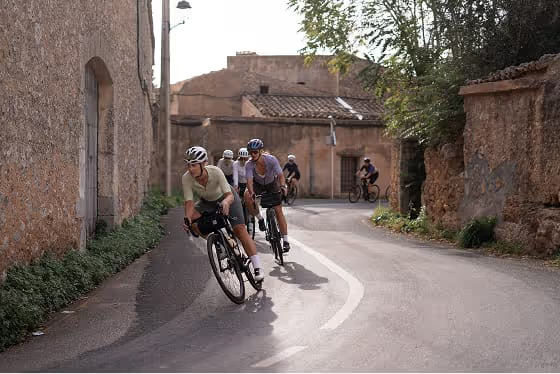5 Small Steps to Improve Your Cycling in 2022
Improve Your Cycling Performance in 5 Easy Ways
It’s great that you want to improve your cycling this year but for goal-setting to be successful, it needs to be SMART.
SMART of course means Specific, Measurable, Achievable, Realistic, and Time-Sensitive. If you just started cycling (let’s be realistic, even if you’ve been cycling for a while), you probably won’t be competing in the Tour de France come July - but if you commit, you could end the year off with your first century or the Rapha Festive 500!
Here are our top 5 tips that you can start implementing today to improve your cycling in 2022.
Ride for Your Mental Health
Cycling is a data-rich activity that gives you countless opportunities to analyse and improve your performance, but it’s important to remember what got you into cycling in the first place.
If you’re anything like us, it’s the sheer sense of escapism - you don’t need to answer your phone, look at emails, or reply to any messages. It’s just you, your bicycle, and the road or trail ahead. In fact, for many of us, it’s the only quiet time we can carve out in the midst of hectic schedules and family life.
Not every ride can - or should be - a chance to beat your PB or take the KOM/QOM title. Some of the best rides are the ones that are unplanned and often, alone.
This year, make a commitment to ride for your mental health once a month. That means no music, no riding partner, and no focus on pushing yourself to improve your cycling. Dedicate this time to immersing yourself in the sights and sounds around you without any distractions. Simply enjoy the ride.
Get Hooked on Strava

Okay, you got us. This step is contradictory to the previous one - but it’s all about balance!
After all, as the saying goes, “If it’s not on Strava it didn’t happen.” Sometimes looking after your wellbeing means switching off and having fun, but sometimes it means igniting your competitive spirit and challenging yourself.
Strava lets you track all of your rides with your GPS device, measure your performance, connect (and compete) with friends, and, if you have a paid subscription, you can enjoy a range of perks from Sundays at no additional cost.
Here are the Sundays Strava Perks you can look forward to:
Device damage £350
As a paid Strava subscriber, you don’t need to worry about your Strava compatible fitness devices. If it gets damaged as a result of an accident while tracking your cycling activity on Strava, we’ll give you up to £350 to repair or replace it.
Taxi fare £30
If your bike meets an untimely fate while you’re out and about, no stress. We’ll reimburse you up to £30 for taxi fare if you’re left stranded due to a bicycle accident or mechanical failure.
Running race entry fee £75
Missing a running race due to an illness or injury is frustrating, but at least now your entry fee won’t go to waste. We’ll pay up to £75 to cover these costs.
Pay More Attention to Your Nutrition
If you’ve recently taken up cycling (even if your intention is to lose weight), we’re happy to tell you that cycling will increase your caloric requirements. But, before you get too excited, this doesn’t mean you can eat whatever you want.
If you want to estimate how many additional calories you should eat after a ride, multiply the distance traveled in kilometers by 25 to 30, depending on how large your frame is. So, if you rode 30km and multiplied it by 25, you’ll need an extra 750 calories.
If your main goal is to lose weight, be careful about how many calories you eat back. You need to be in a caloric deficit to lose weight, so experiment with eating back less than your burned calories if you don’t see the scale budging.

Here are some extra nutrition tips to improve your cycling:
- Don’t eat too much before a ride. Cycling while full is uncomfortable, to say the least, so eat a small meal that includes protein and carbohydrates a few hours before your ride.
- If you struggle with low blood sugar, diabetes, or anything else that affects how you need to fuel yourself for a ride, speak to a dietician before embarking on a training program.
- If you’re riding for under one hour, you don’t need anything more than water on your ride.
- If you’re riding for between 1 - 3 hours, take water, an electrolyte sports drink, energy bars, and gels.
- If you’re riding for over 3 hours, water, an electrolyte sports drink, energy bars, and gels, along with a small meal like a sandwich.
Get Comfortable on Your Bicycle
Some level of discomfort can be expected if you’re training hard and riding long distances, but it can be tricky to know what’s normal, what’s an indication that your bicycle doesn’t fit you properly, and what may be an indication of not having enough core strength to support your posture.
A great starting point to improving your cycling is to get a professional bike fit. A bike fit will help you optimise your power, comfort, aerodynamics, and help you avoid injury. Each fitter will have their own process, but you can expect an interview, assessment, adjustment of the main contact points, and a report.
Once you’re sure your bike fits you correctly, you can get to work on conditioning your body to hold your cycling posture. Core exercises like pilates are great for strengthening your muscles, and a stretching or yoga routine after rides can help you avoid normal aches and pains.
Switch Your Commute for a Bike Ride
This probably goes without saying, but the quickest way to improve your cycling is to simply cycle more. But, for most people, that’s easier said than done. Sometimes there just aren’t enough hours in a day to work, spend time with your family, relax, and ride.
One of the best ways to incorporate more cycling into your daily routine is to start commuting by bicycle. Not only will it improve your performance and rack up training miles, but it’s also great for your overall well being.
Studies show that commuting to work can wreak havoc on your mental health, causing increased levels of stress and anxiety. In fact, there’s even a term for it - commuter burnout. If your daily commute is more than 35 minutes each day, you may be at risk.
Here's why you should cycle to work:
- It’ll make you happier and healthier
- It’s an easy way to improve your cycling and get in extra miles
- It’s environmentally friendly
- You may be able to get a tax-free bike through the Cycle to Work scheme
For ultimate peace of mind, get Sundays specialist bicycle insurance for cover against theft (from and away from home), accidental damage, malicious damage, and more.
For only £2 per month, you can also get Sundays cyclist liability insurance that protects your pocket in the event you injure someone or damage their property while cycling. Get a quick online quote.
Latest from the Journal
Join the Sundays cycling community
Subscribe to our newsletter for coverage tips, community stories, and enriching cycling experiences delivered straight to your inbox.






